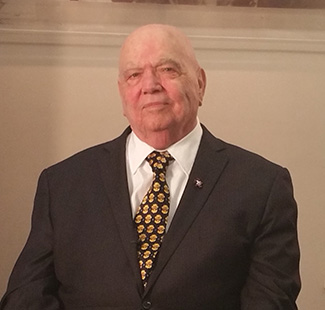
Richard Hovannisian
Out of all the Armenian families in the small California town where Richard Hovannisian grew up, Hovannisian grew up in an English-speaking household and didn’t know much about his heritage or Armenian history.
Today, this couldn’t be further from the truth.
Hovannisian is one of the leading experts on the Armenian Genocide who founded the Armenian Studies program at UCLA and is an adjunct professor at USC, where, for several years, he has advised USC Shoah Foundation on its Armenian Genocide testimony collection.
Today, thanks to him, the Institute has reached a major milestone: adding a large collection of more than 1,000 audio interviews of Armenian genocide survivors recorded by Hovannisian and his students over the years.
Hovannisian attended UC Berkeley and received his PhD in history at UCLA, where he joined the faculty in 1962. Inspired by his recent travels to the Middle East, he founded UCLA’s undergraduate and graduate programs in Armenian history a few years later.
In 1969, Hovannisian created one of his most remarkable courses, History 107D: a seminar in which students recorded and conducted interviews with Armenian Genocide survivors and then transcribed them.
“I grew up with that generation of survivors, and I thought they’d be around forever,” he told The Daily Bruin in 2011. “Then I looked left, and I looked right, and they were disappearing.”
Hovannisian is the author of Armenia on the Road to Independence; The Republic of Armenia, Volumes I-IV; and The Armenian Holocaust; and has edited, contributed to or written dozens of other books, scholarly articles and journals on Armenia and Near Eastern society and culture. He is also a leader in the Armenian scholarly community, serving on the board of directors of organizations including Facing History and Ourselves, the International Institute on the Holocaust and Genocide and the Society for Armenian Studies, which he also co-founded.
He was also honored by His Holiness Karekin I and the President of Artsakh with the Medal of St. Mesrop Mashtots for his advancement of Armenian Studies.
As USC Shoah Foundation’s scholarly advisor for its Armenian Genocide testimony collection, he worked with indexers on using proper search terms when the Institute was integrating hundreds of interviews gathered by the late documentary maker J. Michael Hagopian. Those 333 testimonies were gathered between 1972 and 2004.
Testimonies in the collection, the largest archive on film of Armenian Genocide interviews in the world, were recorded in 10 countries and 10 languages, including English, Armenian, Arabic, Kurdish and Turkish.
The vast majority of Hovannisian’s collection was recorded in Armenian, but up to 20 percent of the testimonies are in English; there is a smaller portion of Turkish and Spanish language interviews.
A pilot of 10 testimonies – seven in English and three in Armenian – are available to the public in the Institute’s Visual History Archive Online. The rest will be added as they are digitized and indexed to the high standards used by the Institute.
To listen, go to the Visual History Archive Online, register for free, and select the box that says “Richard G. Hovannisian Armenian Genocide Oral History Collection.”